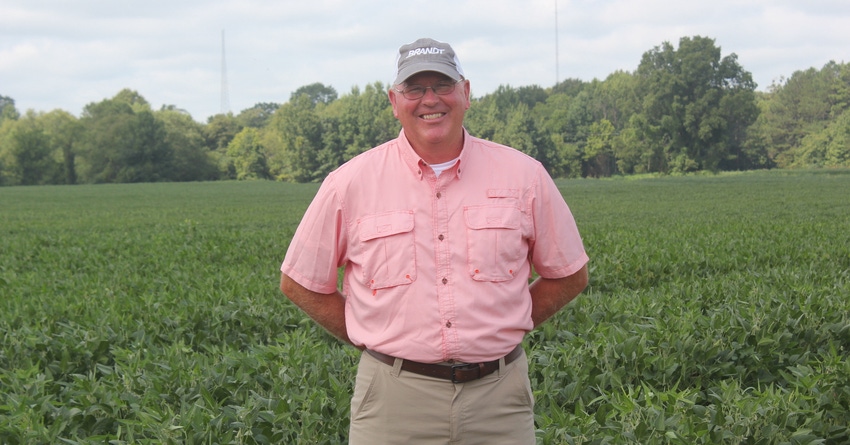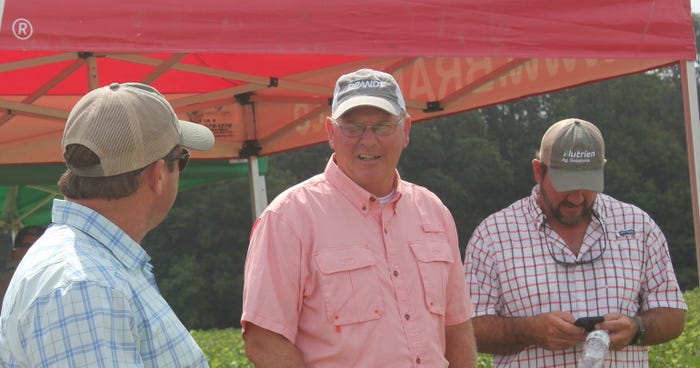
David Hula holds the all-time world corn yield record at a whopping 616 bu/a. Hula, who farms in Virginia, recently visited the Midsouth, where he was a speaker at the Brandt Agronomy Field Day in Aberdeen, Miss. We caught up with him during his visit to get his take on 2022 weather conditions, what’s worked for him this season, and advice he has for fellow farmers.
Delta Farm Press: How’s the weather been in your part of the world?
David Hula: Just like what I’m seeing here. We’ve been dry and extremely hot, and nighttime temperatures have been hot, too. The nighttime temperatures have really taken the cream off our crop.
Our western farm, where we have pivots, most of that is irrigated corn this year. But the dryland corners will be in the 40-50 bushel range this year. At the home farm in the East, I think we’re going to be a little better. We’re going to be in that 100–200-bushel dryland range because we’ve been getting a little bit more rain there. Matching populations and hybrids, that’s helped mitigate some of this heat.
DFP: What can growers learn from 2022 weather? What practices have you used to mitigate extreme heat and drought?
Hula: If you farm long enough, you’re going to see this kind of season more than once. I’ve seen it several times now. You know, if we knew we were going to be hot and dry we’re not going to plant corn. So, we’re always optimistic when we buy seed and plant seed, and we just deal with what the Good Lord gives us after that.
As far as making the best of it, first, you have to get your crop off to a good start. Then have good nutrition – fertilizer and micronutrients — that’s key. Have the plant balanced so it can defend. Don’t do anything that’s could negatively impact the structure of the plant like compaction. Have a good root system and do all you can to enhance that. That gives us our best defense.

DFP: It seems like there are so many new products that address crop nutrition and stress mitigation. Are they a good investment?
Hula: I am a believer that certain nutrients mitigate stress, like potassium. That is a huge for corn, cotton, soybeans, it just helps the plant transpire. Then we get into other products where you might say, ‘Well, if that’s the limiting factor on their operation, then it might help.’
When we start talking about biologicals, I’ve tried all kinds of things. I’ve tried putting sugars out there, amino acids, because that’s what we’re burning, might as well put them out. It doesn’t always work. But for some of these stress mitigators and nitrogen enhancers, our growers have got to evaluate them to see if they work for each individual operation. There are some that do work. I’ve seen great things. Some I’m not so sure about, but they might work in somebody else’s environment, as opposed to mine.
DFP: What’s the most common question you receive from growers?
Hula: The most common question is ‘What’s it like picking 500-600 bushel corn?’ I tell them it’s just like picking 200-300 bushel corn, except you have to go slower. So, all we do is before we get to the end of the field, we have a grain tank full, where sometimes we can make a round. That’s the most common question I get. And I get it. That’s what I would like to know, too.
DFP: Do you anticipate breaking any more yield records this year?
Hula: If there’s a 5 or 6 numeral in our yield contest entries, it’s not going to be the first digit. We may not even see a 4 as the first digit. We’ve just been hot at nighttime. And that’s the one thing we try to mitigate. Usually, we can cool it down through pivot irrigation, but we’ve just had such a long stretch of it. The heat has been relentless. But that is just farming. We’re dealing with nature. The Good Lord is going to stress us and He's going to reward us at some point in time.
DFP: Have you tried anything new this year that is showing potential?
Hula: In soybeans, I’m doing more Smart KB (Brandt’s foliar liquid potassium and boron). We like what we’re seeing with that. We’re doing a lot of tissue sampling and we’re seeing the proof in the pudding there.
In corn we’re trying some biologicals, some products that enhance the nitrogen. I’m still huge into running the SoilWarrior strip tilling. That is to me one of the best things we’ve done as far as cultural changes in our operation over the last five to ten years.
DFP: Any advice you have for farmers as they wind up this tough season?
Hula: I’ve had a lot of younger growers ask me this year, what one thing can I do? Keep that positive attitude. Don’t give up. We’re going to be stressed. I’ve farmed when we had 40-bushel averages. Growers can’t be discouraged.
I’m reminded of the late Francis Childs (the first farmer to grow corn yields over 400 bu/a), who said you have to be willing to change. We get so into this routine and if something didn’t work this year you don’t want to try it again. Well, there could have been other factors that prevented success. For example, the weather may not have been as cooperative. Be willing to try some new things, and then try them again.
About the Author(s)
You May Also Like






